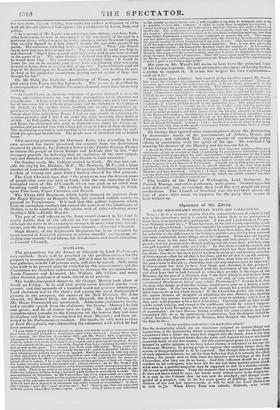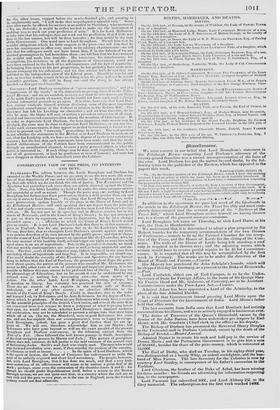Cipiniand of OK Vrr.
LORD BROUGHAM'S POSITION Wall IllS COLLEAGUES.
TIMES—It is a received maxim that the acknowledgment of a fault is half way to the correction ; and it is certain that where there is t10 perception of error there is no prospect of improvement. A true and a just friend of the pre- sent Ministry- would say—" There has been, in the last session especially, touch reason for dissatisfaction : inadequate remedies for admitted grievances have been proposed, and less has been done than ought to have been done; but these faults are referable to the differences in the Cabinet, and the cause having been removed and unity established, better things are to be expected. When men are tugging different ways in the same boat, much yawing and little progres, is to be ex- pected; but the present crew, though perhaps not all crack men, will keep time and pull together, and make good way." In this there would be candour and promise; but when we are told that everything which has been found faulty is excellent--that there has been perfect wisdom in every act and in every omission of Government—that for all that it has done, and for all that it has left undone, it merits the highest praise—when we are told this, what have we to hope? If the past course us deemed so admirable, how can any improvement be expected ? If Government has done its best, how blank and cheerless is the prospect? The public were justly discontented with the barrenness of the last session; and what have they to look forward to when they are told, in the organ of the Ministry, by the pen of a Minister, that " the little which is said to have been done would breve immortalized the memory, not only of any session of the norefiamed Parliament, but of any whole Parliaments" Certain it is, that the man who thinks so of the last session, would never give us a better, a more nitful session. If the last session had merit enough fur a whole Parliament, what remains to us but blank despair? If the Chancellor writes the truth, let the nation dismiss all thoughts of rebuilding the two Houses; fur, tapering down from last session, legislation must soon come to nothing; and it may in that case well dispense with a local habitation. Certainly such an idler would not be worth lodging, and except in the workhouse should be refused support. According to Lord Brougham, the tire was an appropriate close of the session of immortality : the two Houses having reached the acme of glory, may have committed felt de se by spontaneous combustion, lest the honour should be sullied hereafter ; like the youth in Terence, who thought the happiest hour the time to die- " Ne hoc gandiumcontaminet vitae argrittulitie aliqua." But the immortality which we see sometimes assigned to certain things and reputations, is the immortality which is immorality to a t ; and we should have conjectured that a letter too many had slipped into the word, were it not that the context puts it beyond doubt that the noble and learned reviewer attributed immortal deeds to the last session. All this extravagant praise of a course con demned by public opinion, as we have before shown, is calculated to damage the 31elbourne Ministry, by giving people to suppose that nothing better than the session of disappointments is to be expected. But though that is the tendency of such injurious defences, we are far from believing that it is actually the effect of them ; for people now so little mind the speeches and writings of the Lord Chancellor, that they can do no harm. Anti this reflection should be a great comfort to his colleagues, who have felt for the last three months pretty much what men in a powder-magazine may be supposed to feel in a thunder-storm. He is now quite harmless. From the moment that a man's partisans plead that he does not mean what he says, his words must indeed cease to be dangerous. It is only in the Cabinet that he can now do mischief; and though disre- garded as a prophet, yet, as he has some power of fulfilling his own pre- dictions of less and less improvement, it 1%111 be well for Lord Melbourne to look to :it. When Drury Lane was rebuilt, IIQleroft, who wrote for the other house, stopped before the newly-finished pile, and pointing to it, emphatically said, "1 will make that inaguitivnce a splendid ruin." Some time afterwards, he offered his services as an author to Sheridan ; who answeted, "No. no, Ilolcroft; it would be rather too bad to make toe the instrument of enabling you to work out your prediction of ruin." It is fur Lord Melbourne to take care that his colleague does not work out his prediction, that if little was done in the last session, less will be done hereafter ; for that would be the ruin of the Government. One word now to Lord Brougham. We tell him that he is under obligations which he little suspects to the press—we tell him that he owes his continuance in office very much to its salutary chastiseinents—we tell him that his colleagues could not have borne him, if in the fulness of his un- checked presumption he had bestridden them—we tell him that we have reduced his weight and made him bearable. His iut,usiuns, his interferences, his assumptions, his dictations in all the departments of Guyer:miens, could not have been endured in the flush of his self-importance and the lust of popularity. In bringing hint down to his just proportions, he has probably been made more human company for his colleagues ; and for this service both he and they ate indebted to the independent part of the Liberal press. Should he wax fat and kick, or in other words, return to his meddling ways, his place will not be worth a month's purchase. He will be flung out—and the thing he has always dreaded—a dowager ex-Chancellor.
Cou P.M( —Lord Durham complains of "gross misrepresentatiou," and of a "suppression of the truth," in the statements respecting himself in the Ella- burgle Review; and we are satisfied, as every one must he who knows any thing of tile noble Earl's manly character, that he would not have made such a charge without substantial grounds to go upon. It is clear, however, that Lord Dur- ham cannot vindieate himself without disclosing some of the must important confidential consultations of the Cabinet in relation to the Reform 11111. The Reviewer has left his Lordship no alternative ; and on him; therefore, be he who he may, the blame will rest, of setting a precedent subversive of all conti• dential and unreserved communication among the members of Government. If, in order to depreciate Lord Durham, the most important state secrets may be divulged, the same may be done to depreciate Lord :Melbourne, or any one else. Under such circumstances, it does appear to us that Government is bound to in- terfere to prevent such " unseemly " proceedings in future. The teal question is, not whether the statements in the Review as to Lord Dothan' he accurate or not, that his Lordship will, we have no doubt, dispose of in the most satisfactory manner ; but the fact that such statements have been made, and that the confi- dential deliberations of the Cabinet have been communicated to the public through an unauthorized channel, to serve a petty persooal object, is what the public is interested in. If such things may he done with impunity, there is an end of all government, at least by gentlemen or men of honour ; and none but eaves-droppers or libellers will henceforth enter the Cabinet.



















 Previous page
Previous page